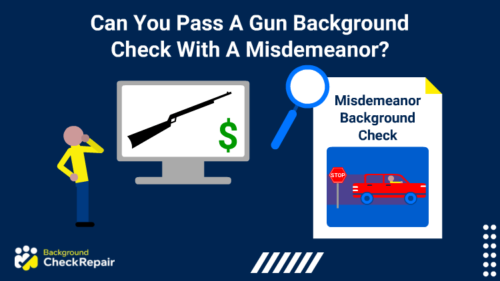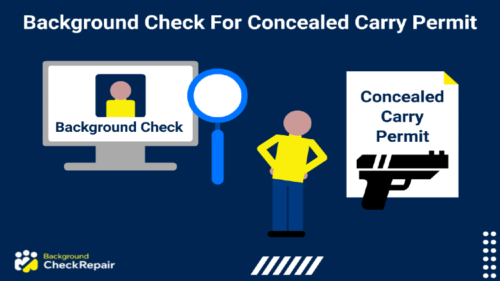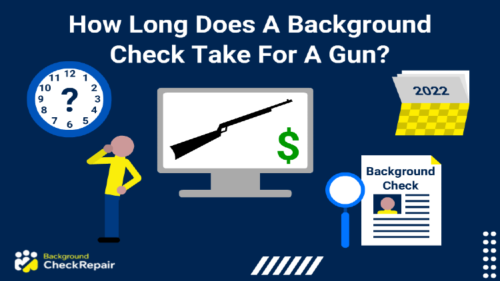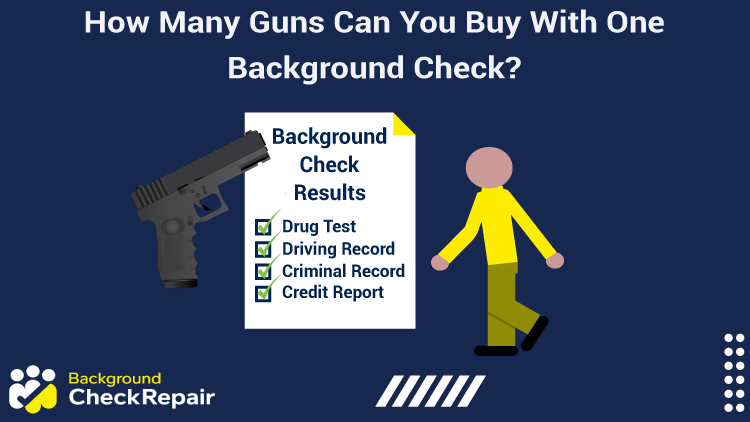
With more and more laws being adopted relating to firearms purchases and related background checks, while criminal activity continues to grow, many people wonder how many guns can you buy with one background check?
Given that statistics show that law abiding gun owners stop anywhere from 6,000-8,000 crimes every day and that there are over 393 million privately owned guns in the U.S., undergoing a firearm background check is pretty routine.
But, what’s the 90-day rule?
Some states employ this rule, which only allows individuals to purchase one rifle and one handgun every 90 days.
However, in most states, there is no limitation to the Constitutional right interpreted by the Supreme Court, and buyers may purchase more than one firearm after passing the national background check.
This guide outlines which states use the 90-day rule and how many guns can you buy with one background check in the others.
How Many Guns Can You Buy With One Background Check?
When asking how many guns can you buy with one background check, the state that the gun purchase is taking place will be the biggest factor. However, purchasing multiple guns with a single background check is possible in every state to a certain degree.
Basically, the NICS background check that is required when someone purchases a gun through a licensed firearm dealer is good for a single transaction, rather than a single gun.1
This means that when someone passes their gun background check, in many states, they are able to purchase as many guns as they want, as long as all of these purchases are made as part of the same transaction.2
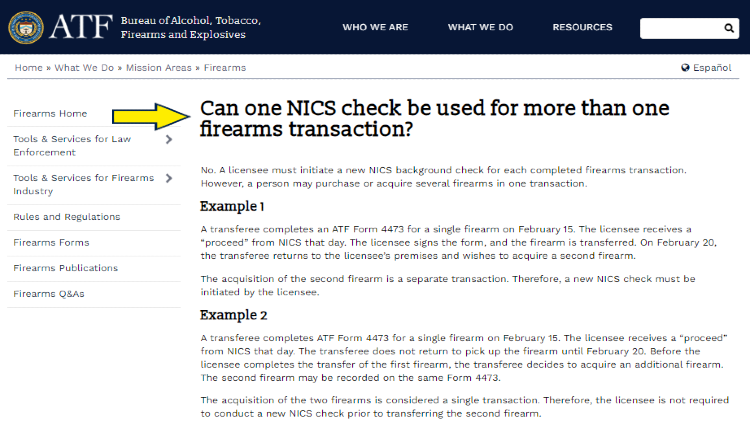
The gun background check used is good for a single purchase, so in states without buying limits, the number of guns a person may obtain can be more than one for a single transaction.
Most of the individuals asking, how many guns can I put on one 4473,3 will be planning on buying several guns and want to avoid the trouble of having to go through multiple background checks. Although there are exceptions in certain states, such as New York’s 90-day rule,4 the majority of states will allow individuals to purchase multiple guns at once, provided they pass the required background check.
For those wondering, what is a 4473, is an ATF form that anyone purchasing a gun from a licensed dealer must fill out prior to the purchase.5 Those hoping to purchase a firearm at a physical gun store will need a completed copy of Form 4473 and you, the buyer will need to provide an acceptable photo ID to the dealer.
It’s important that individuals check their state laws to ensure there are no state-level limitations on how many firearms can be purchased using a single background check. Besides state laws, there are a few other things that individuals should be aware of, whether they plan to buy a single gun or numerous firearms in a single transaction.
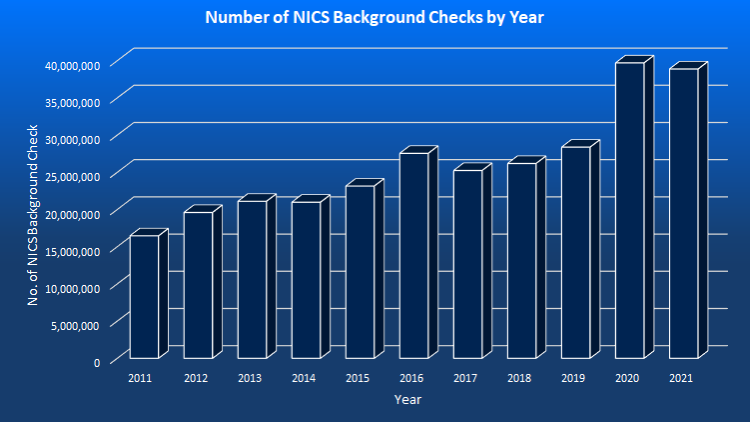
One of the most frustrating things for gun owners is having their NICS background check denied due to filling out the various forms incorrectly. This is why it’s often a good idea to at least take a look at some of the required forms before visiting a gun store so that individuals can ensure that they have all the required information handy to fill it correctly the first time.
There are also various services available to help individuals fill in these forms. Those who have looked at firearms online might have seen ads about “how Fastbound can help,” helping individuals understand and fill in the required firearms forms correctly is one of the main services that Fastbound offers.
Some individuals might be in a situation in which they paid for the gun but failed a background check. In order to lower the chances of this happening, individuals should research and understand a few key legislative elements regarding state and federal firearms laws.
Summary of Federal Law
The Federal Firearms Act requires licenses for individuals who manufacture,6 transport or are involved in firearms sales to have special licenses to do so. This was one of the earliest forms of legislation that was passed relating to firearms.
Perhaps the most notable firearms law that affects who can buy firearms and what kind of firearms are available to the general public is the Gun Control Act of 1968.7 This imposed numerous restrictions on firearms such as banning the importation of firearms that were not for sporting purposes, as well as enacting a minimum age for individuals purchasing firearms, a requirement that all firearms have a visible serial number as well as expanding the list of offenses and circumstances that would prevent an individual from purchasing a firearm.
The Federal Assault Weapons Ban made certain firearms illegal,8 such as semi-automatic weapons as well as large-capacity ammunition feeding devices.
Summary of State Law
State firearms laws vary widely from state to state and change fairly frequently.
Those wondering, how many guns can you buy with one background check, will need to ensure that their state does not have any laws that prevent them from purchasing multiple guns over a specific amount of time.
The most updated list of state firearms laws is published by the ATF.9
When Did Firearm Background Checks Begin?
Many people are likely wondering, when did firearm background checks begin, and might be surprised to find that modern background checks for firearm purchases have only been around since the passing of the Brady Act in 1993.10
Before 1993 individuals who were attempting to purchase certain firearms were asked to fill out a questionnaire regarding their criminal history. However, the gun seller was not actually required to verify this information, resulting in many individuals obtaining firearms when they should have been barred from doing so.
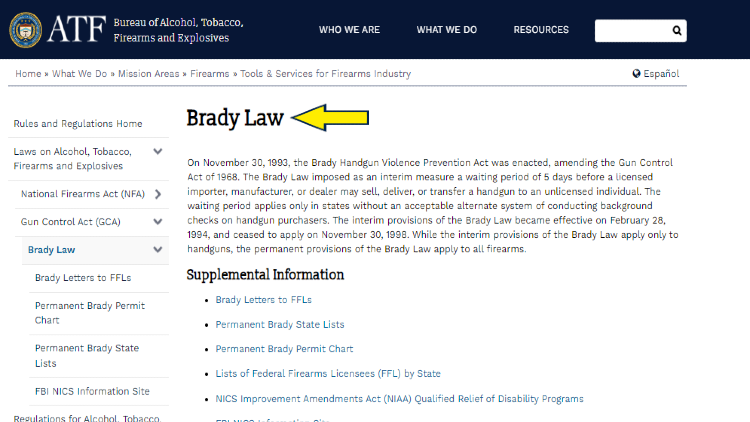
The permanent provisions of the Brady law remain in place, although the interim provisions regarding handguns were ended in 1998.
In 1993 the Brady Act was passed which led to the eventual adoption of the NICS which is still used by the FBI to this day. The law also required that individuals who were attempting to purchase a handgun also be required to pass a background check.
As far as what’s involved in a background check for firearms, the NICS performs checks of various government criminal databases of criminal records, mental health records, and juvenile records, as well as checks to see if the individual has an active warrant or if the individual has a protective order filed against them. This means that NICS will perform a mental health background check, a juvenile criminal records search, and a federal warrant search.
The NICS was created to identify prohibited persons that were attempting to purchase a firearm. When it comes to who’s a prohibited person, those who meet the following criteria will not be able to purchase a firearm in the United States.
- Individuals convicted of a crime are punishable by one year or more in prison.
- Individuals that are currently fugitives from justice.
- Individuals who are addicted to a controlled or illegal substance.
- Individuals that have ever been committed to a mental institution.
- Individuals who are in the United States illegally.
- Individuals who have received a dishonorable discharge from the United States Armed Forces.
- Individuals who have renounced their United States Citizenship.
- Individuals who have a court-ordered restraining order or protective order filed against them.
- Individuals who have been convicted of the crime of domestic violence.
Gun Background Check Statistics
With gun sales in the U.S. rising every year, more and more people are interested in gun background check statistics such as how many guns are purchased each year, how many background checks are performed and how many people are purchasing guns without a background check being performed. Although the FBI does make certain data public, there is certain information that the FBI simply does not have access to and must be found via independent sources performing their own studies to get a grasp on certain data.
How Many Guns Are Bought Without a Background Check?
One of the most pressing questions for many individuals, especially those that are in favor of stricter gun control legislation is, how many guns are bought without a background check? This can be a hard number to find as there are several ways that an individual can acquire a firearm without undergoing a background check.
Multiple studies have been run on this subject and although each one has slightly different methods to gather this information, most arrive at the conclusion that nearly a quarter of all gun purchases are made by individuals who did not undergo a background check when making the purchase.11
This may seem remarkably high but the important thing to keep in mind is that this is mainly due to state laws for gun purchases. Although many people are under the impression that anyone that purchases a firearm is required to undergo a NICS check, this is not actually the case.
The NCIS check is only required for individuals who are purchasing from a licensed gun dealer.
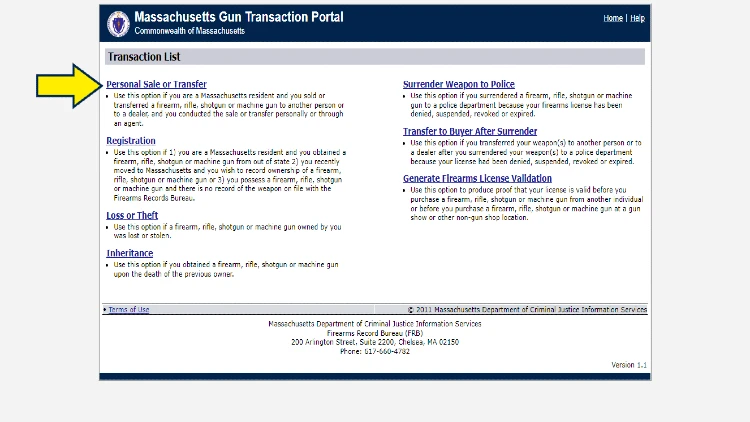
Massachusetts requires citizens to register personally owned firearms.
Individuals are also allowed to sell guns privately in most states and so long as gun sales are not their primary source of income then they are not required to obtain a federal license to sell firearms.
There are laws that prohibit individuals from selling guns that they have reason to believe are not able to purchase a gun, but there are obvious faults to the way this law is written which allows for private sellers to sell guns to individuals that would be otherwise prohibited from owning a firearm.
US Background Check for Guns Statistics
Finding certain US background check for guns statistics is extremely easy since the FBI publishes much of its data regarding NICS checks. This makes it easy to see not only how many checks the FBI is performing each year, but also to track trends in gun purchases from month to month.
Although gun sales and thus the number of NICS checks performed each year are rising, many people will be surprised to see just how much it is rising. The NICS data published by the FBI in 2022 shows that the number of NICS checks performed in 2019 was around 28,370,000.1
However, in 2020 this number skyrocketed to over 39,000,000.
| Year | Number of NICS Background Checks |
| 2011 | 16,454,951 |
| 2012 | 19,592,303 |
| 2013 | 21,093,273 |
| 2014 | 20,968,547 |
| 2015 | 23,141,970 |
| 2016 | 27,538,673 |
| 2017 | 25,235,215 |
| 2018 | 26,181,936 |
| 2019 | 28,369,750 |
| 2020 | 39,695,315 |
| 2021 | 38,876,673 |
With such a massive jump in sales, there was a subsequent backlog in the FBI when performing these background checks.
This caused many gun owners to utilize private gun sales to avoid having to wait for a background check to clear, meaning the total amount of guns sold in the U.S. in 2020 was likely far higher than the FBI numbers suggest.
Background Check and Gun Statistics by State
State gun laws and the culture surrounding firearms both heavily affect the number of firearms sales in each state.
Individuals can use the chart below to learn more about firearms sales in 2021 by each state.12
| State | Estimated Guns Sold in 2021 | Gun Ownership Percentage Based on Population |
| Alabama | 593,790 | 55.50% |
| Alaska | 90,843 | 64.50% |
| Arizona | 479,269 | 46.30% |
| Arkansas | 244,326 | 57.20% |
| California | 1,096,943 | 28.30% |
| Colorado | 536,628 | 45.10% |
| Connecticut | 119,179 | 23.60% |
| Delaware | 66,355 | 34.40% |
| District of Columbia | 4,934 | 10.90% |
| Florida | 1,422,294 | 35.30% |
| Georgia | 495,897 | 49.20% |
| Hawaii | 33 | 14.90% |
| Idaho | 197,744 | 60.10% |
| Illinois | 545,849 | 27.80% |
| Indiana | 568,539 | 44.80% |
| Iowa | 63,957 | 43.60% |
| Kansas | 207,888 | 48.90% |
| Kentucky | 366,137 | 54.60% |
| Louisiana | 373,524 | 53.10% |
| Maine | 125,921 | 46.80% |
| Maryland | 209,139 | 30.20% |
| Massachusetts | 141,488 | 14.70% |
| Michigan | 648,752 | 40.20% |
| Minnesota | 374,056 | 42.80% |
| Mississippi | 305,468 | 55.80% |
| Missouri | 601,604 | 48.80% |
| Montana | 149,751 | 66.30% |
| Nebraska | 31,310 | 45.20% |
| Nevada | 146,330 | 47.30% |
| New Hampshire | 141,943 | 41.10% |
| New Jersey | 224,853 | 14.70% |
| New Mexico | 190,418 | 46.20% |
| New York | 383,059 | 19.90% |
| North Carolina | 300,107 | 45.80% |
| North Dakota | 74,850 | 55.10% |
| Ohio | 655,772 | 40.00% |
| Oklahoma | 395,286 | 54.70% |
| Oregon | 374,575 | 50.80% |
| Pennsylvania | 1,019,744 | 40.70% |
| Rhode Island | 41,893 | 14.80% |
| South Carolina | 326,070 | 49.40% |
| South Dakota | 98,736 | 55.30% |
| Tennessee | 700,084 | 51.60% |
| Texas | 1,624,677 | 45.70% |
| Utah | 160,587 | 46.80% |
| Vermont | 53,682 | 50.50% |
| Virginia | 620,267 | 44.60% |
| Washington | 504,401 | 42.10% |
| West Virginia | 134,231 | 58.50% |
Denied Background Check Statistics: How Many Guns Can You Buy With One Background Check?
When it comes to denied background check statistics, the numbers are often far lower than many individuals would expect: regardless of the number of guns the buyers plan to purchase in one transaction.
However, knowledge of background check laws is easier to access than ever. This means that many individuals who would be denied a gun after failing a NICS background check will simply not even bother attempting to purchase one and will either try to obtain a gun illegally through a private seller or simply not purchase a firearm at all.
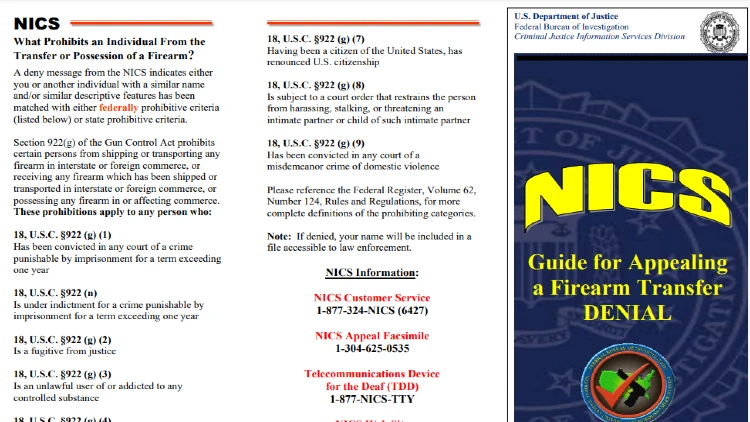
When a firearm transfer is denied, the ATF provides a step by step instruction to the legal codes and processes that must be followed.
Despite the massive number of firearms sales in the U.S. each year, the FBI has denied 2 million applications since the NICS was put into effect in 1998.13
How Many Assault Weapons Are Used in Crime?
The term “assault weapon” is very vague and often used to describe any and all firearms.
Determining how many assault weapons are used in crime is somewhat difficult as there are various interpretations of what is considered an assault weapon.
Furthermore, they are very rarely used in a crime, as the majority of gun-related deaths and injuries involve the use of handguns.
According to the Bureau of Justice Statistics,14 the ATF estimates that in the year proper to the assault weapons ban, only 15 of all firearms in circulation could have been classified as assault weapons.
The most accurate way for the ATF to determine what kinds of weapons are used in crimes is to examine the data regarding gun-tracing requests.
A gun-tracing-request happens when a crime is committed that involves a firearm and the ATF is tasked with finding out what kind of firearm was used and to see if they can identify who the owner of the firearm is or at least track the weapon to the point of sale. Gun tracing request data in 1993 determined that approximately 8% of all firearms incidents involved the use of a weapon that could be classified as an assault weapon.
How Many Legal Gun Owners Commit Crime?
Although many individuals are concerned with how easy it is for those with criminal records to obtain a gun, there is also concern regarding how many legal gun owners commit crime.
But, the fact remains that a very minute number of legal firearm owners commit crimes.
As mentioned, there are an estimated 393 million firearms in private ownership in the United States. That’s 1.2 firearms for every single person.
Logically speaking, since many of those people are not old enough to legally own a firearm, and there are approximately 2.19 million people incarcerated in the U.S. the number of legal gun owners who commit crimes is an extremely small percentage.
Studies show that the number of guns used in crimes is less than 1 percent.
Since the only way to perform a background check is to examine previous crimes, there is a strong possibility that someone with a clean record can obtain a gun with the intent to commit a crime.
Unfortunately, this kind of information is extremely difficult to determine as no studies on the matter have been performed by government agencies since 2004 when a survey was performed on prison inmates. The study found that nearly half of the inmates surveyed obtained their guns through methods that were pseudo-legal, but also avoided a background check.15
The study also found that around 40% of inmates claimed to obtain the gun through explicitly illegal methods such as stealing the weapon.
How Many Times Are Guns Used To Prevent Crime?
When it comes to how many times guns are used to prevent crime, there is a widely held belief that law-abiding gun owners use their guns to prevent crime fairly frequently throughout the country. However, studies performed by the Harvard School of Public Health show that this might not be true.16
Many of these instances do not constitute self-defense at all, which is very similar to the ‘mass shooting’ statistics, that immediately group an incident with more than one victim (including gang-related events) as a mass shooting. There is also evidence that suggests that many claims of self-defense are closer to the definition of brandishing a weapon,17 which is when a firearm is shown as means to intimidate the other individual.
It’s also important to note that the Harvard study used extremely small numbers, examining about 300 incidents.
The Center for Disease Control, in a report requested by President Obama in 2012, found that as many as 3 million crimes every year, or some 8,200 every day, are prevented by legal gun owners.
The latest studies suggest that the number of crimes prevented by legal gun owners is over 6,800 every day… with most of the crimes resulting in ZERO loss of life, or bloodshed, and without the gun even being fired.
Although there are a ton of different state and federal laws to consider, buying a gun is not as hard as it may seem.
When it comes to how many guns can you buy with one background check, individuals should know that there is no federal limit on how many guns can be purchased in a single transaction. However, individuals will still need to familiarize themselves with state laws on the matter.
More and more laws relating to firearms and firearm background checks are being adopted every year in the United States. Although there is a lot to consider, individuals will need to be familiar with their local laws before planning on purchasing multiple guns at a time, since when it comes to how many guns can you buy with one background check, there is no federal limit.
Frequently Asked Questions About How Many Guns Can You Buy With One Background Check?








